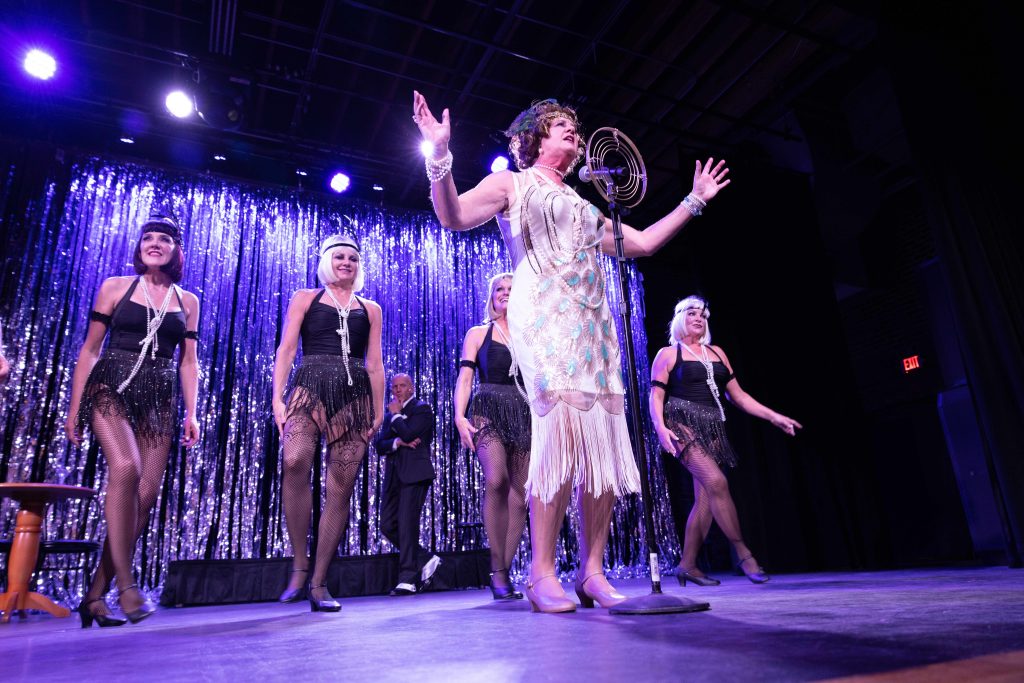Akima celebrates 75 years of relationship building in Knoxville
Emma Bea Stallings needs no time to ponder when asked why she’s stuck with the Akima Club for so long. Stallings is the active member with the longest standing in the Knoxville women’s club. “Two reasons,” she declares. “One is because of the friendships I’ve made and, two, for the good that I’ve had the opportunity to participate in for our community.”
She cites the club’s involvement at the Ronald McDonald House, where members have provided meals, decorated for Christmas and visited with clients. “I love hearing about their families and how Ronald McDonald House is helping them,” she says.
The annual Christmas party the club throws for the clients at Sunshine Industries, which serves people with intellectual disabilities, also springs to mind. “It’s one of the biggest soft spots in my heart. I love the personal contact with the clients. And when we interview people with the nonprofits that we give grants to, I love hearing their stories too.”
It’s that connection — both among its members and with the nonprofit community it serves — that’s kept the Akima Club going strong for 75 years.
Dedicated to Service
From its humble beginnings in 1947, when seven women formed a club initially associated with the General Federation of Women’s Clubs, Akima Club eventually evolved into its own independent local entity with a Native American name that means “leader.” Its active membership is maintained at no more than 150 women of all ages from all parts of the city. About 100 more support their activities as sustaining members.
“Our members are having new babies and having grandchildren,” says Harriet Miller, publicity chair. “Back when it was started, most were homemakers; now we’re mostly women who work. We didn’t have any single women initially. And our meetings used to be day meetings. Now they’re mostly at night.”
Members recommend women they know as potential members. Every active member pays annual dues and agrees to complete a set number of hours doing volunteer work and attending Akima meetings and serving on committees. They have no set meeting space — most of their meetings are held at the Bearden Banquet Hall — and their storage space consists of members’ attics and garages. They have no paid staff. All the money they bring in they send back out to the community.
Each year Akima awards local nonprofits with grant money that will directly benefit their clients. In 2021, they distributed more than $83,000 to 49 agencies. Recipients of Akima grants literally extend from A, the Alzheimer’s Association, to Z, Zoo Knoxville. In between is everything from the American Cancer Society to James White’s Fort, Knoxville Symphony to Volunteer Ministry Center. Akima members serving as volunteers have, among other things, created arrangements for Random Act of Flowers, delivered meals to homebound seniors for Mobile Meals and staffed the Fantasy of Trees for East Tennessee Children’s Hospital.
In addition, they’ve gotten some community projects up and running on their own. The Christmas party for Sunshine Industries is a club project near and dear to lots of members’ hearts. Akima was instrumental in starting KidsFest for Dogwood Arts. It was responsible for the startup of the children’s museum now known as The Muse in 1961. It contributed heavily to the planetarium that was added to the museum in 1976. The club also was involved in the startup of a Big Sisters agency in Knoxville, which has since been rolled into Big Brothers Big Sisters of East Tennessee.
Because their records of financial support in the early years of the club are incomplete, it’s hard to say exactly what Akima has contributed to the nonprofit community. But it’s more than $1.5 million. And how do they raise that money? That’s where the hijinks come in.

Fun with a purpose
Joy McCabe remembers the year she belted out “Knoxville the City with Balls” to the tune of “There’s No Business like Show Business.” The song was a silly homage to the larger-than-life globes — the Sunsphere and the orange orb at the Women’s Basketball Hall of Fame — that bracket downtown.
Traci Rhea, chair of the 2022 cabaret, says it’s the easygoing husbands who bring down the house every time the Akima Club puts on its biennial cabaret. In the cross-dressing tradition of Dustin Hoffman as Tootsie and Robin Williams as Mrs. Doubtfire, the “Akimen” strut on the stage in leotards and heels, in cheerleaders’ costumes and as bellydancers.
It’s certainly the hilarity the Akima members display presenting their campy variety dinner show that draws crowds. And it’s the money it raises for other local nonprofits—$155,000 just this year—that keeps them coming back to do it again.
“Where else can you wear fishnets and false eyelashes when you’re 50 years old?” McCabe says. “It’s a fun thing to do, and it raises a lot of money.”
This year’s show was presented in February, and the theme was The Roaring 20s, comparing the 1920s, when the world was recovering from the Spanish Flu pandemic, to the 2020s, when…. well, we all know. The setting was a speakeasy, and the venue, The Mill and Mine, worked well, allowing performers to mingle with the audience as they moved past their tables. (Interestingly, their 2020 cabaret was held the last weekend before the Covid-19 shutdown.)
The script is written and produced by Chester McCurry of Los Angeles, and directed by Jonathan East and his wife Brooke, who’s also the choreographer. David Brooks is the musical director. All of the professionals have one thing in common in their backgrounds: time spent performing or directing the entertainment at Dollywood. Brooks is currently the theme park’s musical director.
McCurry’s script is submitted for Akima approval, then, once finalized, sent to the directors. Costumes are organized and parts assigned. Rehearsals take place four nights a week for seven weeks. But long before that, the Cabaret chair and her committee have been busy, lining up sponsors, arranging for a silent auction, identifying a venue and much more. Just ask Traci Rhea, this year’s Cabaret chair. “I’ve been working on it for two years, and for the past 18 months there have been a lot of hands on deck,” she says just a few weeks before showtime. “It’s a rewarding thing. Our members are great; they do things before I ask. They figure it out; they’re go-getters.”

Music throughout the year
In addition to the Cabaret, Akima members entertain throughout the year when the Akima Singers perform at senior care facilities and community events. A club tradition in the 1960s and ‘70s that faded away, it was revived in 2004. David Brooks is also music director for the Singers, arranging music and recording tracks. They perform medleys from the World War II era, as well as Broadway show tunes, country music hits and old-time Southern gospel pieces. From fall through spring they perform regularly, as much as twice weekly during the holidays.
“You can really see the power of music,” says McCabe, who’s the committee chair for the Singers. “You can see how much the songs mean to them (the seniors in the audience). When we sang ‘That’s What Friends Are For’, we saw two ladies hold hands and look at each other. They know all the words to the WWII medley. People who may never talk sing along to the songs. It’s magical. And it keeps us ready for cabaret.”
Finally, friendship
No discussion of the Akima Club would be complete without mentioning the importance the members place upon the friendships they form there. That, they say, is why their community volunteer efforts are siphoned through Akima rather than directly with nonprofit agencies.
McCabe credits the Cabaret with creating the bonds that form among members. “When you’re backstage changing clothes and practicing in front of everyone, you laugh, you get to be friends. Close friends. It’s important for that reason. Friendship is a big part of our mission. “
“I’ve gotten to know a lot of people that I’d never have met,” says Rhea. “All have the heart for service and from there we become friends.”
“The pull for me,” says Miller, “ is getting to understand what the community is all about. We do things we’ve never done before. We learn about nonprofits and experience what they go through to raise money.”
Tricia Lee, Akima president, echoes Miller’s sentiments. An active member for 11 years, she says, “It’s fascinating to volunteer at all the different events — and they are so diverse — and that it is a way to really know about Knoxville itself. I also enjoy learning more about the Akima members as we work together.”
Their efforts create bonds that don’t break.

Comments are closed.